-
 Art of Wellness Acupuncture & Traditional Chinese Medicine (TCM)11704 Wilshire Blvd, Suite 295, Los Angeles, CA, 90025
Art of Wellness Acupuncture & Traditional Chinese Medicine (TCM)11704 Wilshire Blvd, Suite 295, Los Angeles, CA, 90025
myartofwellness@gmail.com310-451-5522 Office Hours
MonClosedTue7:30 am --4 pmWed7:30 am --4 pmThu7:30 am -- 4 pmFri7:30 am -- 4 pmSat7:30 am -- 4 pmSunClosedOur office opens from Tuesdays to Saturdays 7:30 am to 4 pm, will be closed on Memorial day, Independent day, Labor day, Thanksgiving day, Christmas and New year.
-
Recent Posts
- How to Treat De Quervain’s Tenosynovitis With Acupuncture and TCM
- Chinese New Year 2026: Year of the Horse
- Acupuncture and TCM Treatment for Perimenopause Symptoms
- How to Treat Insulin Resistance With Acupuncture and TCM
- How to Treat Metabolic Syndrome With Acupuncture and TCM
- How to Treat Syncope With Acupuncture and TCM
- How to Treat Thoracic Outlet Syndrome With Acupuncture and TCM
- How to Treat Dupuytren’s Contracture With Acupuncture and TCM
- How to Treat Nutcracker Syndrome With Acupuncture and TCM
- How to Treat Rosacea With Acupuncture and TCM
- How to Treat Perioral Dermatitis With Acupuncture and TCM
- Lymphatic Drainage With Acupuncture and TCM
- How to Treat Turf Toe With Acupuncture
- How to Treat Nerve Pain With Acupuncture and TCM
- How to Treat Watery Eyes With Acupuncture and TCM
- How to Treat Ovarian Cysts With Acupuncture and TCM
- Sign up to receive news and updates and get my free report:“The Top 10 Reasons to Try Acupuncture”

December 2025 M T W T F S S 1 2 3 4 5 6 7 8 9 10 11 12 13 14 15 16 17 18 19 20 21 22 23 24 25 26 27 28 29 30 31
Inflammation
How to Treat Acne With Acupuncture and TCM
By Xiaomei Cai, L.Ac., Ph.D. & Qineng Tan, L.Ac., Ph.D.

Acne breakout, pimples, blackheads? Painful cystic acne and acne scars can affect your confidence and even lead to depression. Acupuncture and TCM provide an alternative skin care option to treat hormonal acne and clear up blemishes.
What causes acne? Acne is a skin condition in which bumps on skin form when hair follicles become clogged with dirt and oil. Sebum, the natural oil produced by skin glands, builds up in the pores and causes blockages. Pimples may appear on the face or other parts of the body (back acne, chest acne, bumps on arms, pimples on scalp/scalp acne, etc.).
Acne is most common during the teenage years, but people of any age can experience skin breakouts. Acne is also influenced by fluctuations in hormones, reactions to cosmetics or foods, weather, and perhaps most commonly, stress.
Rosacea is another skin condition that typically causes redness, flushing, and visible blood vessels on the skin, but it can also cause red bumps to break out, similar to acne. This is known as “acne rosacea.”
Everyone gets a few pimples at some point in their lives. However, severe acne that causes scarring can have a serious impact on a person’s confidence in daily life, as well as being physically painful.
There are many types of products and acne medication available, both over the counter or with a prescription, including: benzoyl peroxide, retinol for acne cream, acne patch, and acne face wash.
Topical treatment for acne may clear blemishes on a skin-deep level. Acupuncture and other TCM skin treatments can help get rid of acne and other skin problems, like rosacea, dermatitis, and eczema by addressing the root causes: hormonal imbalances, inflammation, and stress.
Types of Acne
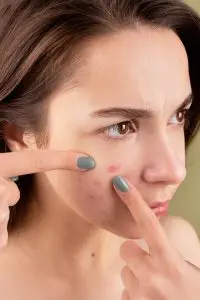
Acne blemishes can show up in different forms. The most commons types of acne include:
- Whiteheads – small, closed, white bumps that develop when a pore is clogged
- Blackheads – open bumps that are filled with oil and dead skin
- Red bumps on skin – papules are hard, red, inflamed bumps on skin
- Pustules – a papule that has a pus-filled tip
- Nodules – large, painful red bumps
- Fungal acne or bacterial acne – when red bumps are caused by bacteria or yeast clogging the follicles
- Acne rosacea – rosacea can cause acne-like breakouts in addition to red flushing
- Cysts or Cystic acne – large, painful, nodules that are deep down, under many layers of skin
Cystic acne is considered to be the most severe type of acne. The deep, inflamed cysts can get very big, last a long time, and leave permanent scars. Cystic acne may be genetic, as it tends to run in families.
Hormonal acne, which is also called “adult acne,” occurs because fluctuations in reproductive hormones like progesterone and estrogen and the stress hormone cortisol stimulate the overproduction of sebum. This kind of acne is most common among women in their 20s through their 40s.
Many women have breakouts that occur cyclically, coinciding with their PMS week or their period. Women may also experience pregnancy acne during the postpartum period. Women over 40 may have unexpected patches of pimples during perimenopause and menopause. Acne is also common among women with PCOS (polycystic ovarian syndrome).
Advanced Dermatology Acne Treatment

Dermatologists have tools that allow them to help remove pimples, known as acne extraction or blackhead extractions. Injections of corticosteroids can help reduce inflamed blemishes. Laser resurfacing can help minimize acne scarring.
A dermatologist can also provide acne medication. Cystic acne and hormonal acne will usually be treated with oral birth control pills to help manage hormone levels. Spironolactone is also sometimes prescribed; this is a diuretic, usually used to treat high blood pressure, that also has an effect on the hormones that control oil secretions.
Isotretinoin, also known as Accutane, is a medication used to treat severe acne, cystic acne, or nodules. Antibiotics are usually prescribed to help clear bacterial acne or fungal acne.
Many of these courses of treatment can cause unwanted side effects, and they do not get to the root cause of the hormone imbalance or internal toxicity.
TCM and acupuncture provide a way to get rid of acne that works from the inside out.
Can Acupuncture Help Acne?
According to TCM theory, skin problems reflect imbalances that originate deeper in the body. Heat and dampness are pathogenic forces that can take root in the organ systems. When heat “overflows” due to imbalances in the digestive or reproductive organs, the body tries to release some of the excess by allowing it to erupt out of the skin.
Acupuncture for acne can both help at the deeper, root level and on the surface of the skin.
We use meridian acupuncture points to target the internal organs that are creating toxic levels of heat or producing too much of some hormone. Then, we also use needles to stimulate the localized areas of the skin that are affected by the breakout and encourage healing.
Acupuncture treatment for acne will often focus on clearing heat from the stomach, intestines, liver, and lungs. This will help lead to fewer breakouts.
Acupuncture needles can be placed on the face where blemishes occur. The tiny “wounds” created by the very thin needles bring blood flow to the area and encourage the body’s repair and rebuilding mechanisms. The thin needles create a micro-trauma that brings blood flow to the area and encourages the body’s repair and rebuilding mechanisms to kick in. This is why acupuncture is also effective as an anti-aging treatment and a good alternative to botox injections.
One study showed a 94% effective rate for patients given 10 sessions of acupuncture for acne. A systematic review of acupuncture treatment for acne concluded that TCM offered an alternative with fewer side effects than conventional medical treatment.
TCM skin care for acne is highly individualized. An acupuncturist finds clues about which organ system is out of balance by observing the placement and appearance of recurrent breakouts, in addition to other symptoms related to digestion, hormone cycles, and emotional health. Cupping is another TCM treatment that can help draw out toxins and excess heat and improve circulation. Herbal supplements and dietary recommendations will be based on each person’s individual situation.
Top 3 Tips to Get Rid of Acne Naturally

Reducing stress is probably the most important thing you can do to help stop breakouts from happening. It is also generally advisable to avoid or limit spicy or greasy foods. Here are some of our best tips for clear skin.
- Start your day by drinking a cup of warm water with slices of lemon.
- Eat cooling foods and avoid foods that produce heat. Melons, mung beans, and radishes are top choices, along with lots of greens and purple-blue berries and plums.
- Try a homemade skin mask made from cooked, mashed dandelion greens. Apply for 20 minutes to get rid of blemishes and redness. Dandelion is a natural antibacterial and antifungal herb and is also good for the liver.
Acupuncture Near Me for Acne in West Los Angeles
Acne affects almost everyone at some point in their life. Breakouts can have a negative impact on your self-esteem, especially when we live in a culture that is so focused on appearances. The best acne treatment involves reduction of stress and inflammation, good nutrition, and restoring internal balance. At Art of Wellness we have over 30 years of experience helping patients heal skin conditions of all kinds.
*This article is for education from the perspective of Traditional Chinese Medicine only. The education provided by this article is not approved by FDA to diagnose, prevent, treat and cure human diseases. It should not stop you from consulting with your physician for your medical conditions. Traditional Chinese Medicine is based on Qi, which is an invisible force that usually cannot be observed by modern science. Because science focuses on testing ideas about the natural world with evidence obtained through observation, these aspects of acupuncture can’t be studied by science. Therefore acupuncture and Chinese herbs are often not supported by double-blind, randomized trials, and they are considered alternative medicine therapies in the United States.
How to Treat Encephalitis With Acupuncture and TCM
By Xiaomei Cai, L.Ac., Ph.D. & Qineng Tan, L.Ac., Ph.D.
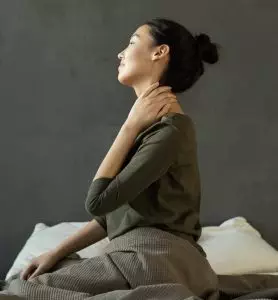
Headache, sensitivity to light, stiff neck, short-term memory loss? These could be signs of encephalitis, or inflammation in the brain. Infectious encephalitis can happen due to an infection; autoimmune encephalitis (AIE) is a type of autoimmune disorder. Acupuncture and TCM offer an adjunct treatment for encephalitis recovery.
What is encephalitis? Encephalitis refers to a serious condition in which the tissues of the brain become inflamed. It can happen to anyone, but is more common among children and older people.
The symptoms of encephalitis are sometimes ignored, because headaches, neck pain, and “brain fog” are so common and may not seem that serious at first. However, in combination, these signs should not be taken lightly. Like meningitis (inflammation of the membrane surrounding the brain and spinal cord), encephalitis can cause serious complications if left untreated. Encephalitis needs to be caught early and treated in order for people to make a full recovery.
What causes encephalitis? Brain inflammation can be caused by the body’s immune response to an infection, or due to an autoimmune disorder, in which the body produces antibodies that attack the brain tissues.
Top 10 Causes of Encephalitis
Viral infections are the primary reason that people develop encephalitis. These could be viruses carried by insects, especially mosquitoes, which are then contracted by humans through bites. Other communicable viral infections that pass from person to person through bodily fluids or close contact can also cause infectious encephalitis.
Infections that can lead to encephalitis include:
- Mosquito-borne viruses such as: West Nile Virus, Eastern Equine encephalitis, Western Equine encephalitis, St. Louis encephalitis, LaCrosse encephalitis
- Tick-borne viruses
- Rabies virus – can be contracted through being bitten by an infected animal
- Polio virus
- Herpes Simplex, Type 1 and Type 2 (HPV1 and HPV2)
- Epstein-Barr virus (mono, mononucleosis)
- Varicella Oster virus (chicken pox, shingles)
- Measles (rubeola)
- German measles (rubella)
- Mumps
There have been cases of people developing encephalitis as a complication of a COVID-19 infection.
Some cases of encephalitis can be caused by bacterial or fungal infections, or by a parasite. It could also be caused by exposure to some sort of allergen or toxin in the environment.
People with weakened immune systems—for example, due to HIV/AIDs—or who take immunosuppressant medications are at a higher risk for developing encephalitis.
Immunotherapy used to treat certain kinds of cancer, such as melanoma, ovarian cancer or lung cancer, has been shown to cause encephalitis in some cases.
Some cases of autoimmune encephalitis, called Anti-NMDAR encephalitis, appear to be related to a certain kind of tumor called a teteroma. In women and young women, especially, this can be an ovarian tumor that produces the antibodies for NMDAR.
Symptoms of Encephalitis
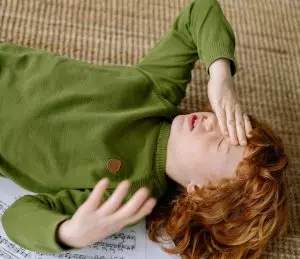
A mild case of encephalitis might only cause some flu-like symptoms that clear up within a few weeks. These types of symptoms include:
- Headache
- Stiff neck, neck pain
- Muscle aches, joint pain
- Fever
- Fatigue, feeling tired and weak
- Sensitivity to light
More severe symptoms of encephalitis can affect both cognitive and motor function:
- Mental confusion, brain fog, difficulty concentrating
- Memory problems, short term memory loss
- Hallucinations
- Seizures
- Severe headache
- Trouble with coordination or balance
- Loss of sensations in parts of the body or face
- Loss of muscle control in parts of the body or face
- Problems with speaking or hearing
- Mood swings, changes in personality
Anti-NMDAR encephalitis (when there may be an ovarian tumor involved, especially) can cause symptoms like pro-domal headache, nausea, and fever, which may then progress to more severe complications, including involuntary movements or tremors, urinary incontinence, rapid heartbeat, and psychiatric symptoms like anxiety, paranoia, or mania.
In severe cases, encephalitis can cause loss of consciousness and even cause a person to go into a coma. It is very important to seek urgent medical attention if you experience any of these symptoms.
Treatment for Encephalitis

Blood tests can confirm whether a viral or bacterial infection is causing encephalitis. Imaging tests like an MRI or CT scan may show the inflammation in the brain. A spinal tap may show an imbalance in cerebral fluids, or an EEG may show unusual electrical impulses in the brain.
However, there are times when these tests will not show exactly what is causing the encephalitis. As with many autoimmune disorders, it can be hard to pinpoint a clear diagnosis for autoimmune encephalitis (AIE).
Medical treatment for encephalitis will depend on what type it is determined to be. Mild inflammation will usually be treated with over the counter anti-inflammatory medications. Antivirals or antibiotics will be prescribed if a specific infection is found to be the cause. Steroids will often be used to help reduce inflammation. In more serious cases, a person may require breathing assistance or anti-seizure medications.
In cases where the cause is believed to be an autoimmune response, immunotherapy is used to try to interfere with the antibodies that are attacking the brain tissues. Steroids will be usually used in combination with other treatments. Plasmapheresis, or plasma exchange, removes some of these antibodies from the blood. Intravenous immunoglobulin therapy introduces healthy antibodies to block the action of the malfunctioning antibodies.
In cases of anti-NMDAR encephalitis where a tumor is present, treatment will include the removal of the tumor in addition to immunotherapy. Patients with this type of encephalitis may also be prescribed antipsychotic drugs to relieve psychiatric symptoms.
Immunotherapy works for some patients, but not all. Many patients will be offered second-line treatments such as monoclonal antibodies or antimetabolites. In some cases, people may seem to recover from encephalitis for a while, and then have a relapse in which the inflammation flares up again.
Most people will need significant time and rehabilitation to help them make a full recovery from encephalitis. Some people will have long-lasting effects, such as memory problems, balance and coordination issues, speech problems, and emotional volatility.
Many of the pharmaceutical treatments available for encephalitis cause significant side effects and can even lead to more physical, emotional and mental health issues. Fortunately, acupuncture and other TCM modalities offer a way to reduce inflammation in the brain and help relieve encephalitis, as well as helping to offset any side effects from other medical interventions.
Can Acupuncture Help Encephalitis?

With acupuncture and Chinese herbs, we seek to treat the root cause and the various symptoms and complications of each condition according to recognizable patterns. This allows us to effectively treat some conditions, such as autoimmune diseases, neurological disorders, and inflammatory conditions that may not readily respond to conventional medicine.
In the TCM view, inflammation occurs because there is too much heat in the body. Yang energy provides the “fire” we need to keep the body warm and energetic. But, if there is an imbalance, and too much heat, this leads to conditions like fever, infections, and inflammation. So, we see pathogenic internal heat as contributing to encephalitis, in addition to outside pathogens like viruses or bacteria. To clear heat that is trapped or stagnant in the body, we will use specific herbs and cooling foods, along with acupuncture treatment and lifestyle changes to reduce physical and mental stress. TCM herbs can also be highly effective against bacterial and viral infections.
The motor control and cognitive problems that can result from encephalitis occur because the inflammation in the brain is affecting the functioning of the central nervous system. With acupuncture, we can help to reestablish connections and neural pathways.
Autoimmune disorders are still not well understood by Western medicine, but with acupuncture we can help to balance and regulate the immune system, so that it is not being inappropriately triggered. This is why acupuncture works well as an adjunct treatment for encephalitis and many other autoimmune disorders.
Acupuncture Near Me for Encephalitis in Los Angeles and West Los Angeles
It can be very difficult when you or someone you love is facing a serious illness and a long, difficult recovery. TCM offers a healthcare option that treats each person in a highly individualized and caring way. At Art of Wellness, we have over 30 years of experience helping people gain back their strength and mobility after suffering from conditions like encephalitis, meningitis, Lyme disease, Guillain Barré Syndrome, Myasthenia Gravis, and many others.
*This article is for education from the perspective of Traditional Chinese Medicine only. The education provided by this article is not approved by FDA to diagnose, prevent, treat and cure human diseases. It should not stop you from consulting with your physician for your medical conditions. Traditional Chinese Medicine is based on Qi, which is an invisible force that usually cannot be observed by modern science. Because science focuses on testing ideas about the natural world with evidence obtained through observation, these aspects of acupuncture can’t be studied by science. Therefore acupuncture and Chinese herbs are often not supported by double-blind, randomized trials, and they are considered alternative medicine therapies in the United States.
How to Treat Morton’s Neuroma With Acupuncture and TCM
By Qineng Tan, L.Ac., Ph.D. & Xiaomei Cai, L.Ac., Ph.D.
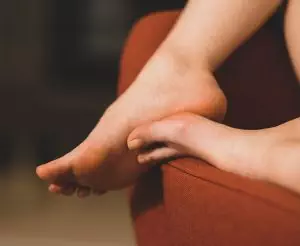
Do you feel like there is a pebble in your shoe all the time? Burning, tingling ball of foot pain? Tenderness between the 3rd and 4th toes? These could be symptoms of Morton’s Neuroma, a condition in which inflammation and swelling around a nerve in the ball of the foot causes toe pain and numbness. Acupuncture and Chinese medicine can help relieve Morton’s Neuroma foot pain.
Morton’s Neuroma is a problem related to swelling and thickening of tissue around a nerve in the foot. This nerve runs under the ligaments that connect the toe bones to the bones of the foot. A neuroma is considered to be a kind of benign tumor or growth and is usually not large enough to feel as an actual lump on the bottom of the foot.
Pain in the forefoot, or ball of foot pain, can be a sign of Morton’s Neuroma, or it could be a symptom of one of several other conditions, including:
- Metatarsalgia – a general term for pain and inflammation in the ball of foot, around the metatarsals. Pain symptoms can be similar to those of Morton’s Neuroma
- Capsulitis – irritation of the capsular ligaments in the foot can cause pain in the ball of the foot that comes and goes
- Gout – a type of arthritis in the foot or toes, caused by a buildup of uric acid
- Rheumatoid Arthritis (RA) – an autoimmune condition that causes arthritic pain that usually begins in the extremities
- Bunion pain – a bony bump that develops on the outside of the big toe joint
- Edema – swelling caused by fluid trapped in the tissues of the foot
- Arthritis – a general term for joint pain, which can affect the toes and feet
- Fractured bones in foot
- Bursitis – bursas are small sacs that act as cushioning for joints; there are bursae around the metatarsals that can become inflamed, causing ball of foot pain
- Tarsal Tunnel Syndrome – a condition where the tibial nerve is compressed in the tarsal tunnel area of the ankle, causing pain and tingling in the foot
- Radiculopathy – compression of a nerve in the lower back can cause pain in the foot, similar to sciatica
- Hammertoe – when one of the toes becomes bent, usually due to pinching shoes, and the muscles and ligaments can’t straighten it, causing swelling and pain
- Diabetes – foot pain and numbness (diabetic neuropathy) can happen due to diabetes.
It is possible for a person to have one of the conditions listed above, and also have a Morton’s Neuroma; sometimes another foot problem can contribute to the development of a neuroma.
Morton’s Neuroma Symptoms
The signs of a Morton’s Neuroma include:
- Ball of foot pain, especially when you put weight on in
- Toe pain or pain between the toes
- Numbness or tingling in the ball of the foot, “pins and needles” sensation
- Swelling between toes or in the ball of the foot
- Pain is better with rest, staying off of your foot
People often describe the sensation as feeling like there’s a pebble in your shoe or a wrinkle in your sock that is irritating, particularly in the area between the third and fourth toes.
Typically, the symptoms of neuroma begin to be noticeable when you are either engaging in an activity that aggravates the nerve, like running or playing a high-impact sport like tennis, or wearing shoes that force the ball of your foot to take extra impact. The pain and tingling may get better when you finish, take off your shoes, and rub your foot.
Over time, though, as the neuroma gets bigger, the pain may get worse and more persistent. If Morton’s Neuroma is left untreated, it can cause permanent damage to the nerve.
What Causes Morton’s Neuroma?

Morton’s Neuroma occurs due to compression of the nerve in the foot that carries sensory signals from the toes. Some people may be more prone to developing Morton’s Neuroma due to the shape of their foot, such as having an unusually high arch, or a very flat foot.
The way that the foot hits the ground and leaves the ground while walking or running can cause a lot of impact and stress to the ball of the foot. An injury to the foot or toes, or other type of trauma, can trigger this nerve condition, as can repetitive stress from a particular sport or other activity. Wearing high heels, flip-flops, or shoes that pinch the toes together can be a factor.
Morton’s Neuroma Treatment
A foot specialist, or podiatrist, will diagnose Morton’s Neuroma by feeling the ball of the foot to see if there is a noticeable mass and to sense what the pain and tingling symptoms are like for the patient. An ultrasound or MRI can show a soft tissue mass like a neuroma, and may be used to confirm the diagnosis.
Usually the first recommendations for a person with Morton’s Neuroma will be to change their footwear: choosing roomier shoes and softer, padded socks, etc. Orthotic supports may be prescribed.
Steroid injections may be used to relieve pain and swelling. If these measures do not help, surgery for Morton’s Neuroma can either be to cut ligaments and other nearby tissues to try to relieve pressure, or in some cases, the affected nerve itself may be removed (neurectomy). This can relieve pain; it can also reduce sensation in the foot permanently. There is also a chance with some surgeries that the neuroma may simply grow again.
Neuromas do not generally go away on their own. The most conservative treatment options for Morton’s Neuroma—like rest, icing, and different shoes—may or may not help to relieve the pain and tingling. Fortunately, acupuncture treatment is an excellent way to help relieve nerve pain.
Can Acupuncture Help Morton’s Neuroma Foot Pain?
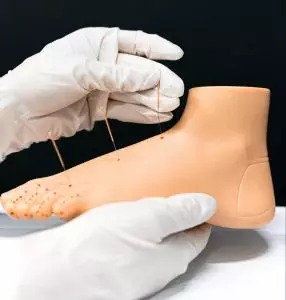
Inflammation and compression around nerves can cause nerve pain in many different parts of the body. For example, pinched or compressed nerves in the spine, or a herniated disc, can cause sciatica or piriformis syndrome: hip pain or pain that radiates down the leg. Compression of the plantar nerve can cause heel pain. A pinched nerve in the neck can cause shoulder pain and/or neck pain. Impingement of the median nerve causes carpal tunnel syndrome. An inflamed trigeminal nerve causes pain in the face. With acupuncture, we are able to provide treatments that can help relieve all of these types of nerve pain.
Acupuncture and other Chinese medicine modalities can help to reduce inflammation that presses on nerves, release scar tissue, and help to heal nerves and the irritated soft tissues surrounding them, like ligaments and muscles. Acupuncture also acts as an analgesic, reducing pain and increasing endorphins.
Evidence suggests that the stimulation of acupuncture points encourages the pituitary gland to release more cortisol, which plays an important role in reducing inflammation. It has been hypothesized that acupuncture influences the release of neuropeptides from nerve endings, which is also a key part of the inflammatory response.
According to TCM theory, this type of pain is often considered to arise due to “Bi Syndrome” conditions, in which stagnation of Qi and blood causes stiffness. The blockage of energy usually occurs due to pathogenic forces of “wind,” “cold,” or “dampness,” or some combination of these factors. Thus, the acupuncture practitioner will choose from a variety of methods including acupuncture, herbal supplements, moxibustion, and Tuina massage to clear obstructions that lead to pain and numbness, such as with Morton’s Neuroma.
Acupuncture Near Me for Morton’s Neuroma, Los Angeles Area
There are many different conditions that can cause foot pain and toe pain. It is important to seek care for foot problems promptly, so that they do not become worse. Acupuncture and other TCM treatments can help improve and maintain foot health for everyone, and can help manage and relieve many types of injury or disorders that affect the feet. At Art of Wellness near Santa Monica, we have 30 years of experience helping people stay active and on their toes.
*This article is for education from the perspective of Traditional Chinese Medicine only. The education provided by this article is not approved by FDA to diagnose, prevent, treat and cure human diseases. It should not stop you from consulting with your physician for your medical conditions. Traditional Chinese Medicine is based on Qi, which is an invisible force that usually cannot be observed by modern science. Because science focuses on testing ideas about the natural world with evidence obtained through observation, these aspects of acupuncture can’t be studied by science. Therefore acupuncture and Chinese herbs are often not supported by double-blind, randomized trials, and they are considered alternative medicine therapies in the United States.
How to Treat Chronic Fatigue Syndrome With Acupuncture and TCM
By Xiaomei Cai, L.Ac., Ph.D. & Qineng Tan, L.Ac., Ph.D.
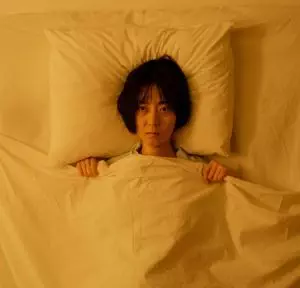
Chronic fatigue syndrome (CFS), also known as myalgic encephalitis (ME/CFS), is a condition marked by extreme fatigue that doesn’t get better, even with rest, and gets worse with physical and mental exertion. Chronic fatigue is not well understood by medical science, but acupuncture and Chinese medicine for chronic fatigue syndrome symptoms can be an effective treatment option.
People with chronic fatigue syndrome are always tired, even after getting a normal amount of sleep, and the condition persists for weeks, months, or years. Other chronic fatigue symptoms include body aches, cognitive problems, vision problems, and emotional or mental health problems, like depression and anxiety.
If a person feels tired all the time, with no medical explanation, for six months or more, and has several other chronic fatigue syndrome symptoms like dizziness, difficulty concentrating, headaches, or sensitivity to light, then they might be diagnosed with CFS, or myalgic encephalitis (ME CFS).
By definition, a syndrome is a collection of symptoms that often appear together in combination, for which the exact explanation is unknown. Chronic fatigue has been considered a syndrome for some time, but has more recently been given the designation of a “disease;” hence, the newer term “myalgic encephalitis,” which refers to muscle pain and inflammation of the brain and spinal cord.
Chronic fatigue syndrome symptoms can be very similar to those of fibromyalgia. People with fibromyalgia also experience severe fatigue, but the primary symptoms of fibromyalgia are musculoskeletal pain that comes and goes all over, especially in “tender points” around the major muscles and joints, along with swelling and inflammation. It is possible to have both ME/CFS and fibromyalgia.
Women are much more likely to have chronic fatigue than men. MECFS can begin to appear at any stage of life, but most usually develops in adulthood. It is estimated that up to 90% of people who have chronic fatigue go undiagnosed.
ME/CFS is a serious and disabling condition that can interfere with even the most basic daily activities. People with chronic fatigue may be able to participate in some events where they exert themselves mentally and/or physically, but afterwards, they will feel completely wiped out and have to take time to recover, often confined to bed. This is called post-exertional malaise (PEM).
Top 10 Chronic Fatigue Syndrome Symptoms
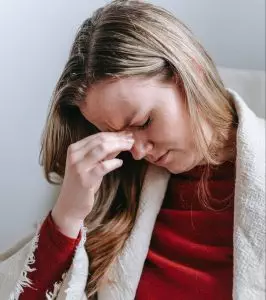
The most common ME/CFS symptoms include:
- Fatigue, tired all the time, weakness
- Sensitivity to light
- Trouble concentrating, hard to focus, memory problems, confusion
- Dizziness, especially when getting up from lying down
- Headaches
- Muscle aches, body ache, muscle weakness, joint pain
- Enlarged lymph nodes in neck or armpit area, sore throat
- Tired after exercise or mental exertion (post-exertional malaise)
- Depression, mood swings, moodiness
- Insomnia, sleep problems
Other signs of chronic fatigue syndrome may include: fever, abdominal pain, weight loss or weight gain, allergies, rash, rapid heart beat, and night sweats/hot flashes.
What Causes Chronic Fatigue?
The cause of ME/CFS is not known. Immune system dysfunction, the aftereffects of having a virus, and psychological factors have all been associated with the development of chronic fatigue.
Some people begin to have symptoms of chronic fatigue after having a viral infection, such as Epstein Barr, mononucleosis, or herpes. Postural orthostatic tachycardia syndrome (POTS) is also strongly associated with chronic fatigue.
While it does seem that some people who suffer from CFS also have immune system problems, chronic fatigue is not considered to be an autoimmune disorder in and of itself. As with other conditions like lupus or fibromyalgia, CFS sometimes appears after a person has gone through some sort of emotional trauma or physical injury.
Some people with chronic fatigue have hormone imbalances related to pituitary hormone, adrenal hormone, or hypothalamus hormones, but it is not understood how these might be related to their condition. Diabetes, anemia, or hypothyroidism can also create hormonal imbalances that can contribute to chronic fatigue.
In some cases, chronic fatigue could be due to a sleep disorder, such as sleep apnea or chronic insomnia. Long-standing mental health issues like depression, anxiety, or PTSD can interfere with sleep and hormone responses, contributing to the chronic fatigue syndrome symptoms.
Treatment for Chronic Fatigue Syndrome Symptoms

There is no clear treatment protocol within conventional Western medicine for ME/CFS. A doctor may diagnose myalgic encephalitis if they have ruled out other possibilities and then try to recommend medications or various types of therapy to help people deal with the symptoms of chronic fatigue.
Pain relievers or NSAIDs will often be the standard recommendation for handling ME/CFS related pain like headaches or muscles aches.
Doctors may prescribe antidepressants as a way of helping patients cope with depression and anxiety related to chronic fatigue. However, these medications can sometimes cause side effects that will exacerbate the chronic fatigue rather than helping it.
Some doctors have tried treating CFS with antiviral medications, corticosteroids, or thyroid hormone medications. None of the pharmacological interventions that have been used to treat chronic fatigue syndrome have proved to be very effective.
Thus, many patients with ME/CFS consider turning to alternative medicine or complementary therapies to relieve CFS symptoms. Acupuncture is now widely recognized as an alternative therapy for chronic fatigue.
Can Acupuncture and Chinese Medicine Help Chronic Fatigue Syndrome?
Traditional Chinese medicine is well suited to treatment for ME/CFS. Overall, TCM philosophy pays close attention to the subtle balance of energy, known as Qi, within the body as a whole, as well as within the various organ systems. By observing the specific symptoms each person experiences as part of chronic fatigue syndrome, we can pinpoint which organ systems are deficient and need strengthening.
Classic TCM patterns related to chronic fatigue diagnosis include:
- Spleen Qi deficiency
- Liver Qi stagnation
- Kidney deficiency
- Yin deficiency
- Heat toxicity
- Phlegm obstruction/dampness
Latent heat and dampness are sometimes the long-term effects of a viral infection or other illness, or a long period of emotional stress. These conditions originate from an external pathogenic factor, but then cause a series of imbalances which weaken the kidneys and other organs over time. Acupuncture treatment and herbs can help reduce inflammation and strengthen Qi.
A TCM doctor will choose acupuncture points and a combination of herbs that will help harmonize the affected systems. With herbs, we are able to get nutrients into the body beyond what you can do with foods alone. A balanced diet that cools heat and tonifies the organs will also be important for recovering strength and energy.
One controlled trial found that four weeks of acupuncture treatment led to improvements in CFS symptoms.
A systematic review of studies regarding acupuncture treatment for ME CFS showed a reduction in the severity of fatigue.
A study using acupuncture and moxibustion treatment for CFS showed a 90% effective rate, with half of the patients feeling that their CFS was “cured.”
Another study involving acupuncture and moxibustion found that the moxa treatment in particular became more and more effective as treatment sessions continued past the 10th treatment. Moxibustion was shown to have an effect on the vagus nerve, which controls the parasympathetic nervous system.
How long it takes to get results from acupuncture treatment for chronic fatigue will vary from person to person, depending on how long the person has been experiencing CFS, and how deeply the organ systems are affected. TCM treatment has a cumulative effect which strengthens over time and several sessions.
Acupuncture Near Me for Chronic Fatigue Syndrome (ME/CFS) in the Los Angeles Area
ME CFS is far more common than statistics show, because many people suffer in silence and invisibility. Now, many people are struggling with chronic fatigue after having COVID-19. TCM modalities like acupuncture, Chinese herbs, and moxibustion, can help relieve fatigue, depression, mental fogginess, poor sleep, and other symptoms of CFS. If you or someone you love has been feeling exhausted for months without improvement, it may be time to consider trying acupuncture for chronic fatigue.
*This article is for education from the perspective of Traditional Chinese Medicine only. The education provided by this article is not approved by FDA to diagnose, prevent, treat and cure human diseases. It should not stop you from consulting with your physician for your medical conditions. Traditional Chinese Medicine is based on Qi, which is an invisible force that usually cannot be observed by modern science. Because science focuses on testing ideas about the natural world with evidence obtained through observation, these aspects of acupuncture can’t be studied by science. Therefore acupuncture and Chinese herbs are often not supported by double-blind, randomized trials, and they are considered alternative medicine therapies in the United States.
How to Treat Emphysema With Acupuncture and TCM
By Qineng Tan, L.Ac., Ph.D. & Xiaomei Cai, L.Ac., Ph.D.

Pulmonary emphysema is a kind of chronic obstructive pulmonary disease (COPD) that causes coughing and wheezing. Symptoms of emphysema are similar to those of chronic bronchitis and pneumonia. Acupuncture treatment and TCM herbs can help relieve emphysema symptoms and other COPD symptoms.
COPD refers to a group of progressive lung diseases, where damage to the lungs causes serious breathing problems and a chronic cough. Emphysema and chronic bronchitis are both considered COPDs, and it is possible to have both of these conditions at the same time.
Bronchitis is when there is inflammation in the bronchial tubes that bring airflow into the lungs, so they get swollen and have too much mucus buildup. Emphysema is what happens when there is damage to the alveoli, the small air sacs that make up the bottom part of the lungs. This makes it difficult to draw a full breath and get enough oxygen into your bloodstream.
Smoking is the primary thing that causes emphysema. Exposure to toxic chemicals or air pollution, repeated respiratory infections, or a genetic predisposition could also be causes of emphysema.
The number one thing people can do to prevent or help emphysema is to quit smoking. Acupuncture treatment can help people overcome nicotine addiction.
Acupuncture and other TCM treatment can also help to clear the lungs, reduce inflammation and shortness of breath, and improve quality of life for people suffering from emphysema and other types of COPD.
Top 10 Symptoms of Emphysema

In many cases, people do not realize that they have emphysema; they may only be feeling some fatigue and shortness of breath and not take much notice. By the time symptoms have become severe enough that they seek medical help, they may have already suffered a lot of lung damage.
Emphysema symptoms are similar to those of bronchitis; although, with acute bronchitis, there may also be chills and fever, and a sense of tightness in the chest.
The most common symptoms of emphysema include:
- Chronic cough, coughing up phlegm, cough with mucus, smoker’s cough, persistent cough
- Shortness of breath, especially with activity or exercise (dyspnea)
- Rapid breathing, breathing fast
- Wheezing
- Sputum, mucus, mucous, phlegm
- Fatigue, chronic fatigue
- Sleep problems, trouble sleeping, insomnia
- Heart problems
- Depression, anxiety
- Weight loss
Other signs of emphysema or COPD include: blue fingernails or lips, enlarged glands, broken capillaries under the skin, enlarged veins around the neck, enlargement of the chest or rib cage (emphysema barrel chest), and repeated respiratory infections.
4 Stages of COPD
As a COPD, emphysema is a progressive lung disease. Sometimes symptoms worsen and breathing becomes more difficult over a short period of time; this is known as an “emphysema exacerbation.” As a person’s respiratory function decreases, they are said to enter the later stages of COPD. Interventions and treatments may help to slow COPD progression.
Emphysema can greatly increase the risk of a person having heart problems, due to extra pressure on the blood vessels around the heart. It can also eventually lead to there being actual holes in the lung tissues, or a collapsed lung (pneumothorax).
Medical Treatment for Emphysema

In order to diagnose emphysema, doctors may look at X-ray or CT scans imaging to see damage to the lungs. Blood tests and other lung function tests like spirometry may show the level of oxygen in your bloodstream.
Medical science has no cure for the lung damage caused by emphysema. Bronchodilators or inhaled corticosteroids may be prescribed, which can help open airways and reduce shortness of breath. Antibiotics may be used to keep infections like the flu or pneumonia at bay. If emphysema gets to a severe stage, some people may need supplemental oxygen. Some patients may be able to have a major surgery, such as lung volume reduction (removal of damaged lung tissue) or a lung transplant.
TCM modalities like acupuncture and herbal medicine can help relieve shortness of breath and coughing, improving quality of life, while staving off further decline in lung function. Acupuncture, herbs, and moxibustion can be used effectively as adjuncts to regular medical treatments for emphysema.
Can Acupuncture Help Emphysema?
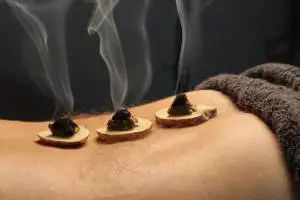
According to TCM theory, emphysema is considered to be caused by Lung deficiency, which can lead to “fei zhang,” distension of the lungs, and/or “chuan zheng,” which means “panting.” TCM can help COPD in several ways: by clearing lung congestion and opening the bronchial airways, helping to boost immune function so that a person can better avoid infections, and providing more nutrient-rich blood flow to the whole body.
One study found that COPD patients who were given acupuncture treatment had improved breathing when doing a six minute walk.
A systematic review comparing TCM treatment and convention treatment for COPD showed that acupuncture, acupressure massage, and moxibustion were all effective interventions and concluded that TCM works well as a complementary medicine/adjunct therapy for COPD.
Many Chinese herbs and herbal formulations are useful for helping to dissolve phlegm and reduce inflammation of lung tissues. TCM herbal preparations can help reduce phlegm and clear heat, relieve inflammation of airways and improve lung function.
Nutrition is also very important for patients with emphysema, who may suffer weight loss due to lack of proper nutrients in the bloodstream. An acupuncture practitioner will work with each individual to determine what kind of food program will help to reduce inflammation and provide adequate nourishment for the organ systems.
Acupuncture Near Me for Emphysema COPD in Los Angeles
TCM is a good way to help people breathe easier, whether they are suffering from allergies, asthma, pneumonia, Cystic Fibrosis, the common cold or a sore throat, or COPDs like bronchitis and emphysema. If you or someone one you love needs to quit smoking, or has been exposed to chemical pollution through their work, acupuncture can help to detoxify and strengthen the lungs.
*This article is for education from the perspective of Traditional Chinese Medicine only. The education provided by this article is not approved by FDA to diagnose, prevent, treat and cure human diseases. It should not stop you from consulting with your physician for your medical conditions. Traditional Chinese Medicine is based on Qi, which is an invisible force that usually cannot be observed by modern science. Because science focuses on testing ideas about the natural world with evidence obtained through observation, these aspects of acupuncture can’t be studied by science. Therefore acupuncture and Chinese herbs are often not supported by double-blind, randomized trials, and they are considered alternative medicine therapies in the United States.